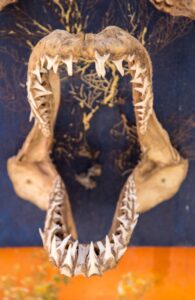
If you’re someone who counts down the days to “Shark Week” or still gets goosebumps from the movie Jaws, you don’t need to venture into deep waters to have a close encounter with North Carolina’s most ancient predators. Instead, just take a walk on one of our local beaches—because the Cape Fear coast is a hot spot for fossilized shark teeth.
What makes the Wilmington area such a great place to find these tiny treasures? It comes down to a mix of natural luck and geological history. The fossil beds just off our coast have been churning up prehistoric remains for generations. Combine that with sandy shorelines and curious beachcombers, and it’s no surprise this region has earned a reputation among shark tooth hunters.
Sharks, unlike humans, are constantly shedding their teeth—sometimes tens of thousands in a lifetime. Since their teeth aren’t rooted in gums like ours, they fall out easily and often. But while the rest of a shark’s body, made mostly of cartilage, breaks down quickly after death, their teeth stick around. That’s because the outer layer is made of a hard mineralized substance called enameloid, which is even tougher than the enamel on our own teeth.
Over time, these teeth sink to the ocean floor, where they get buried under layers of sediment. With enough pressure and the right mix of minerals, they gradually harden and fossilize. Some of the teeth found along our shores are millions of years old—left behind by sharks from long-extinct species.

These tiny fossils aren’t just cool souvenirs. Scientists use them to study the evolution of sharks, what they ate, and how ocean ecosystems have changed over time. They even offer clues about how shark populations have dropped in recent decades due to threats like overfishing and climate change.
If you’re hoping to try your luck at finding a fossil, head to areas near tidal pools or sandbars—especially after a beach nourishment project or strong storm. In our area, Holden Beach and Ocean Isle Beach in Brunswick County are local favorites, while Topsail Island also offers great opportunities.
But one of the most unique spots isn’t a beach at all. In the Cape Fear River, just off River Road Park, a group of islands created from dredging projects has earned the nickname “Shark’s Tooth Island.” You’ll need a kayak or boat to get there, but local guides offer trips for those who’d rather not paddle on their own.
Whether you’re a science enthusiast, a beachcombing hobbyist, or just looking for a fun family outing, hunting for fossilized shark teeth is a unique way to explore the natural history hidden right beneath our feet.
